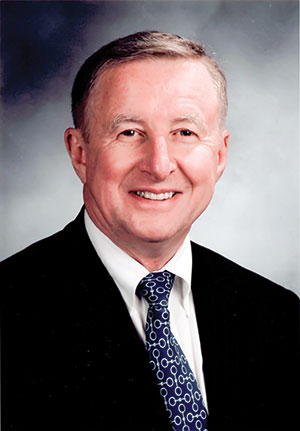Antonio M. Gotto Jr. MD, DPhil, FACC: A Lifetime of Leading Achievements in Lipid Research
Profile | Antonio M. Gotto Jr., MD, DPhil, FACC, first became involved in cholesterol research while he was a fellow at the National Heart, Lung, and Blood Institute at the National Institutes of Health (NIH). “I wanted to take advantage not only of my medical training, but also of the years of research experience I had gained by pursuing a career in which I could study a disease in the laboratory and simultaneously apply it to patients in the clinic,” he says. “Basic research and clinical research in atherosclerosis and lipoprotein metabolism provided me the opportunity to study these disorders at the laboratory, as well as treat patients, and also pursue clinical studies in the treatment of patients in the clinic and hospital wards.”

Gotto’s work in the field of lipoproteins and atherosclerosis has transformed the way patients with dyslipidemia are treated. While at the Baylor College of Medicine in Houston, TX, Gotto and his colleagues completed groundbreaking research that has led to greater understanding of the apoB protein and lipid modification.
In recognition of his accomplishments, Gotto was awarded the Lifetime Achievement Award at ACC.15. He says that the award “does not just reflect on me, but also all my colleagues, family and friends, who have supported my career over many years.” Gotto feels that the honor recognizes not only his contributions to research on the causes of atherosclerosis and relationship between dyslipidemia and cardiovascular disease, but that it also recognizes his efforts to educate the public about the risk of cardiovascular disease and how to prevent it.
Currently the Dean Emeritus for Weill Cornell Medical College and Provost for Medical Affairs Emeritus for Cornell University, Gotto received his undergraduate degree from Vanderbilt University, where he says both Vice Chancellor Madison Sarratt and F. Tremaine (Josh) Billings, MD, encouraged him to pursue a career in academic medicine and to apply for a Rhodes scholarship at Oxford University. “At Oxford, Sir Hans Krebs, the professor of biochemistry, and Sir Hans Kornberg, my immediate supervisor, encouraged me to pursue a doctorate in biochemistry in their laboratory and to incorporate research into my professional goals.”
He credits Kurt Isselbacher, MD, at Massachusetts General Hospital, with encouraging him to pursue a career in academic medicine and says Donald Fredrickson, MD, at the NIH provided him with an opportunity to enter the field of lipoprotein research and clinical lipidology in relation to cardiovascular disease. Finally, he says that Michael E. DeBakey, MD, FACC, and Ted Bowen, PhD, “provided me with an environment and opportunities to pursue my career in cardiovascular medicine at Baylor College of Medicine and Methodist Hospital in Houston.” Gotto served for 20 years as the chair of medicine at Baylor before he took his current position at Cornell. “These years of administrative medicine also provided me with the opportunity to influence the careers of students, fellows and younger faculty,” he adds.
Gotto acknowledges the importance of the support and understanding of his wife and family throughout the different chapters of his career. “Without my family support system, I certainly could not have pursued the various activities I have been fortunate enough to experience,” he says. He advises that those pursuing a career in the medical field should “set aside time for your family and yourself and to involve yourself in activities that benefit others and expand beyond your own narrow personal interest.”
Gotto’s interests outside of work include spending time with his family, particularly his grandchildren, at his home in Maine, and with the friends he has made and patients he has treated all over the world. He also enjoys playing tennis, reading, sports and political discussions.
Clinical Topics: Diabetes and Cardiometabolic Disease, Dyslipidemia, Lipid Metabolism, Nonstatins
Keywords: ACC Publications, Cardiology Magazine, Apolipoprotein B-100, Apolipoproteins B, Atherosclerosis, Biomedical Research, Cardiovascular Diseases, Cholesterol, Dyslipidemias, National Heart, Lung, and Blood Institute (U.S.), National Institutes of Health (U.S.), Lipids
< Back to Listings

